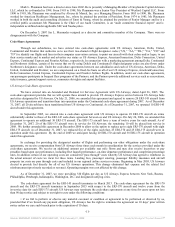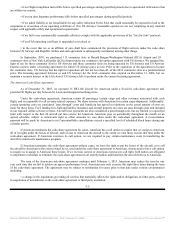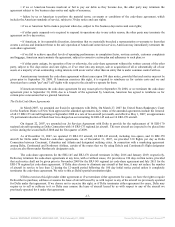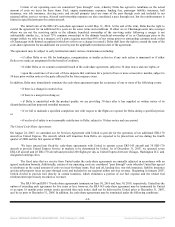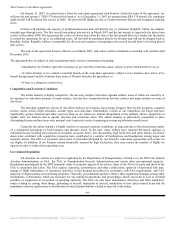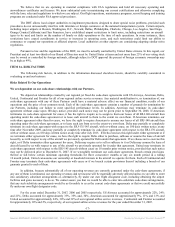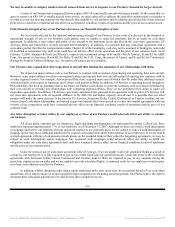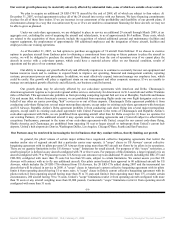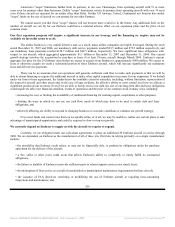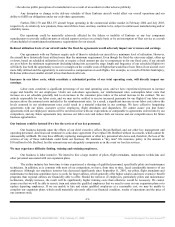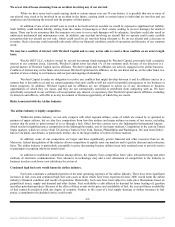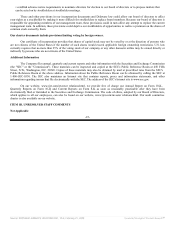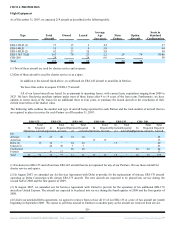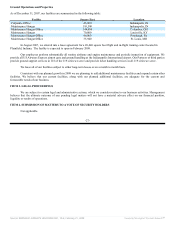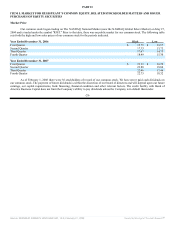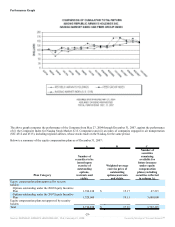Frontier Airlines 2007 Annual Report Download - page 26
Download and view the complete annual report
Please find page 26 of the 2007 Frontier Airlines annual report below. You can navigate through the pages in the report by either clicking on the pages listed below, or by using the keyword search tool below to find specific information within the annual report.
American's "scope" limitations further limit its partners, in our case Chautauqua, from operating aircraft with 51 or more
seats even for partners other than American. Delta's "scope" limitations restrict its partners from operating aircraft with over 76 seats
even if those aircraft are operated for an airline other than Delta. Neither US Airways, United, Continental nor Frontier has similar
"scope" limits on the size of aircraft we can operate for our other Partners.
We cannot assure you that these "scope" clauses will not become more restrictive in the future. Any additional limit on the
number of aircraft we can fly for our Partners could have a material adverse effect on our expansion plans and the price of our
common stock.
Our fleet expansion program will require a significant increase in our leverage and the financing we require may not be
available on favorable terms or at all.
The airline business is very capital intensive and, as a result, many airline companies are highly leveraged. During the years
ended December 31, 2007 and 2006, our mandatory debt service payments totaled $93.5 million and $79.9 million respectively, and
our mandatory lease payments totaled $138.7 million and $99.5 million, respectively. We have significant lease obligations with
respect to our aircraft, which aggregated approximately $1.1 billion at December 31, 2007 and December 31, 2006. Our current
growth strategy involves the acquisition by purchase or lease of at least 29 more aircraft through March 2009. Embraer's current
aggregate list price for the 29 Embraer aircraft that we expect to acquire from Embraer is approximately $900 million. We expect to
lease or otherwise acquire on credit a substantial portion of these Embraer aircraft, which will increase significantly our mandatory
lease and debt service payments.
There can be no assurance that our operations will generate sufficient cash flow to make such payments or that we will be
able to obtain financing to acquire the additional aircraft or make other capital expenditures necessary for our expansion. If we default
under our loan or lease agreements, the lender/lessor has available extensive remedies, including, without limitation, repossession of
the respective aircraft and other assets and, in the case of large creditors, the effective ability to exert control over how we allocate a
significant portion of our revenues. Even if we are able to timely service our debt, the size of our long-term debt and lease obligations
could negatively affect our financial condition, results of operations and the price of our common stock in many ways, including:
• increasing the cost, or limiting the availability of, additional financing for working capital, acquisitions or other purposes;
• limiting the ways in which we can use our cash flow, much of which may have to be used to satisfy debt and lease
obligations; and
• adversely affecting our ability to respond to changing business or economic conditions or continue our growth strategy.
If we need funds and cannot raise them on acceptable terms, or at all, we may be unable to realize our current plans or take
advantage of unanticipated opportunities and could be required to slow or stop our growth.
We currently depend on Embraer to supply us with the aircraft we require to expand.
Currently, we are obligated under our code-share agreements to place an additional 29 Embraer aircraft in service through
2009. We are dependent on Embraer as the manufacturer of all of these jets. Our risks in relying primarily on a single manufacturer
include:
• the possibility that Embraer could refuse, or may not be financially able, to perform its obligations under the purchase
agreement for the delivery of the aircraft;
• a fire, strike or other event could occur that affects Embraer's ability to completely or timely fulfill its contractual
obligations;
• the failure or inability of Embraer to provide sufficient parts or related support services on a timely basis;
• the interruption of fleet service as a result of unscheduled or unanticipated maintenance requirements for these aircraft;
• the issuance of FAA directives restricting or prohibiting the use of Embraer aircraft or requiring time-consuming
inspections and maintenance; and
-20-
Source: REPUBLIC AIRWAYS HOLDINGS INC, 10-K, February 21, 2008 Powered by Morningstar® Document Research℠


